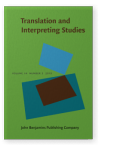Vol. 14:3 (2019) ► pp.442–463
Interpreting for Soviet leaders
The memoirs of semi-visible men
Top interpreters are rarely able to discuss publicly negotiations between their bosses-cum-clients. Yet the downfall of Nazi Germany and the USSR allowed some interpreters to speak, in interviews and memoirs, without fear of retribution. In the end, only a few told their story, and some did not always tell it correctly, either because of memory lapses or because of a desire to appear more informed or to distance themselves from the people for whom they had worked. Still, these publications contain material to investigate to what degree, in the service of an all-powerful client, interpreters remained “invisible” or exercised a “special interactional power, […] as a result of his or her bilingual and bicultural expertise” (Mason and Ren 2012: 238). This article presents a case study of Soviet interpreters for Stalin, Khrushchev, Brezhnev and Gorbachev and their associates, with memoirs by the interpreters for Hitler and British PMs consulted for cross-correlation.
Article outline
- Introduction
- Semi-visibility
- Co-interlocution
- Empowerment
- Non-neutrality
- Positioning
- Conclusions
- Notes
-
References
